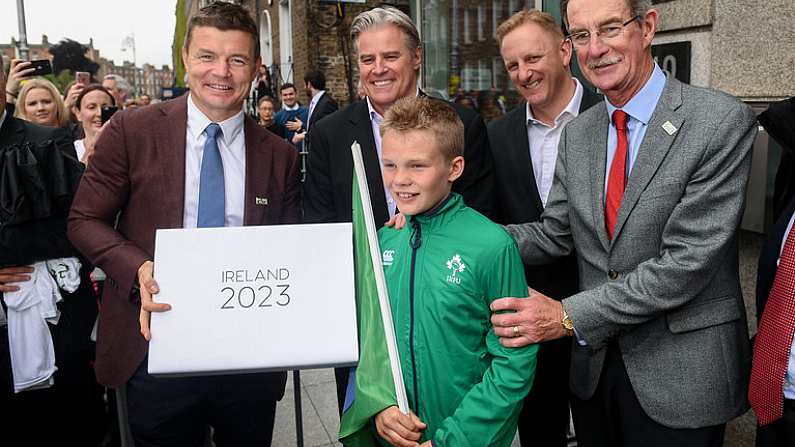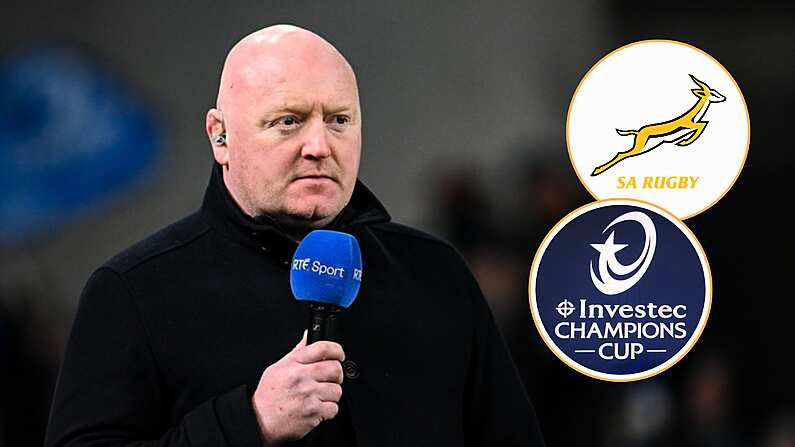The announcement by World Rugby that their technical review recommended South Africa as the most suitable nation to host the Rugby World Cup in 2023 was initially met with a wave of national disappointment within Ireland.
There was subsequent defiant statements - or in the case of the French, petty barbs - directed at World Rugby.
However, it has been a week since the release of the 220 page document providing adequate time to delve into the fine print and in doing so the Irish media have discovered a number of contentions within the report.
Firstly, as Brendan Fanning reported in the Sunday Independent, the report was outsourced to the Sports Consultancy, an independent agency, who worked with members of World Rugby. Fanning concluded that the actual script is riddled with inaccuracies and typos:
In the writing of the report they forgot to put on the spell-check. Moreover, whoever was in charge of proofing it was clearly under a whole pile of time pressure. That kind of stuff doesn't inspire confidence.
Gavin Cummiskey in the Irish Times revealed a redacted section of the report proved Ireland did match South Africa's commercial offer and tournament fee. They went on to interview the head of the Irish bid, Kevin Potts, who suggested the report may have ignored Ireland's correspondence:
There were surprises in the report. Take Paírc Uí Chaoimh. It has been built and active since August. We sent World Rugby footage of the stadium yet commentary in the report inferred it was not yet built and required significant upgrade.
They went on to claim World Rugby failed to inform the IRFU of necessary requirements during the process:
World Rugby had to instruct the bidding nations to stop promising TV rights and other agreements to voting regions. This was not directed at the Irish bid.
In the Irish Independent, the report's safety ranking was queried. Ireland were awarded the same score on security as France and South Africa, despite the fact France were in a state of emergency until last week and repeated reports of rising crime rates in South Africa.
A global index by the Institute for Economics and Peace ranks Ireland as the 10th safest country in the world. France is ranked 51st because of the threat of terrorism in recent years. South Africa is ranked at 123rd out of 163 countries because of major concerns about crime, homicide and access to weapons. Just last week Ernie Els, one of the country's top golfers, appealed for people outside of South Africa to take notice of a spate of farm attacks there. "People are being murdered every day," he said. Yet World Rugby still does not see Ireland as a safer pair of hands.
In the Sunday Business Post, Tom McGurk wonders was their incentive to award South Africa the tournament in order to save the game from decline there. In a piece titled "Is this really about saving South African rugby?" he looks at failing attendance figures and internal difficulties as pressing issues within South Africa:
South Africa is now the front-runner to host the 2023 Rugby World Cup. Yet its sport is in disarray because of missed deadlines and financial chaos.
South Africa were awarded the 2022 Commonwealth Games in 2015 but subsequently stripped of them after failing to meet key obligations. This was the first time a nation was ever stripped of the tournament. South African sports minister Fikile Mbalula stated financial constraints hampered that process, although this clearly was not a concern for World Rugby.
It has also emerged Dick Spring, Ireland's World Rugby bid chairman, has sent a letter to those involved in the voting process outlining his "shock" at the "narrow, operational and theoretical" process the committee took to conducting the report. The letter was seen by independent.ie.
Spring feared the report could have a damaging consequence to the future of rugby and it's development worldwide, arguing it
Will preclude the majority of potential new bidders from ever having the opportunity to host Rugby World Cup, therefore thwarting the growth of the game and rugby's flagship event.
He outlined his firm belief Ireland was the most suitable candidate:
We remain totally convinced that Ireland offers you the best possible option for the 2023 Rugby World Cup – one that has several unique aspects that could never be scored in a narrow report.
The fact these issues were raised by Irish media should not obscure the glaring issues within the report. As much as Ireland must face up to their own inadequacies, so too must world rugby.
The final vote takes place on the 15 November.












